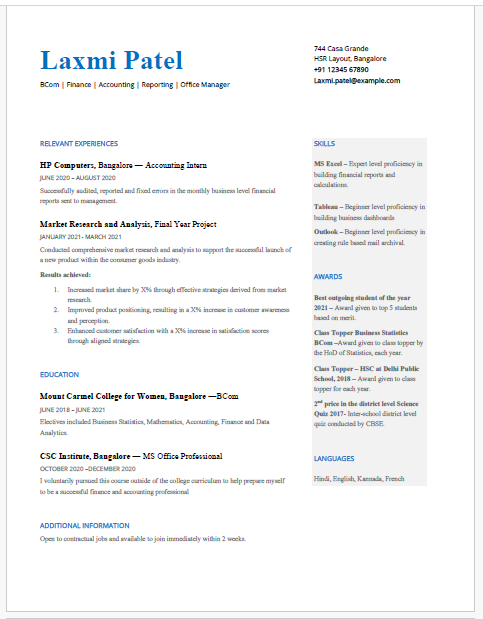Accountant
B.Com

About this template
This is a very simple and professional resume which can effectively highlight your skills and experiences in a clear and concise manner.
This template is made in MS Word so, users can easily customize it to fit their specific needs.
Some important and useful technical skills for B.Com, Accountant
For a B.Com graduate pursuing a career as an Accountant, possessing a strong set of technical skills is essential for effectively managing financial records and ensuring accurate financial reporting. Here are ten important and useful technical skills:
1. Accounting Software Proficiency:
Familiarity with popular accounting software such as Tally, QuickBooks, SAP, or Oracle is crucial. These tools help in managing financial transactions, generating invoices, and preparing financial statements, ensuring efficiency and accuracy in accounting tasks.
2. Financial Reporting:
Knowledge of financial reporting standards like IFRS or GAAP is vital. This skill ensures that financial statements are prepared in compliance with regulatory requirements and accurately reflect the financial position and performance of the organization.
3. Taxation Knowledge:
Understanding tax laws and regulations, including GST, income tax, and corporate tax, is essential for accountants. This skill helps in accurate tax filing, compliance, and advising on tax planning strategies to optimize tax liabilities.
4. Data Analysis and Excel Skills:
Proficiency in Microsoft Excel is a must for accountants. Skills in using formulas, pivot tables, and data visualization tools help in analyzing financial data, forecasting, and preparing detailed reports.
5. Auditing Techniques:
Knowledge of auditing processes and techniques, including internal and external audits, is important. This skill ensures the accuracy and reliability of financial information and helps in identifying and mitigating risks.
6. Budgeting and Forecasting:
Skills in budgeting and forecasting are crucial for financial planning and analysis. This involves creating and managing budgets, analyzing variances, and forecasting future financial performance to support strategic decision-making.
7. Financial Analysis and Ratios:
Understanding key financial ratios and metrics, such as liquidity ratios, profitability ratios, and solvency ratios, is essential for evaluating the financial health of an organization. This skill helps in making informed business decisions.
8. Bookkeeping and Ledger Management:
Proficiency in maintaining accurate and up-to-date financial records, including ledgers, journals, and balance sheets, is fundamental for accountants. This skill ensures the integrity and reliability of financial data.
9. Regulatory Compliance:
Awareness of relevant regulations and compliance requirements, such as anti-money laundering (AML) laws, is important. This skill ensures that the organization adheres to legal standards and avoids penalties.
10. Cost Accounting:
Understanding cost accounting principles and methods, such as job costing and activity-based costing, is useful for determining the cost of products and services. This skill helps in pricing decisions and profitability analysis.
Conclusion:
These technical skills equip B.Com graduates with the knowledge and tools needed to excel in accounting roles, ensuring accurate financial reporting, compliance, and effective financial management.